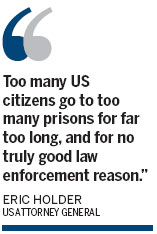US moves to shorter prison time for some drug offenses

The United States unveiled steps on Monday to fix what it considers the longstanding unjust treatment of many nonviolent drug offenders, aiming to bypass tough mandatory prison terms while reducing the country's huge prison population and saving billions of dollars.
"Too many US citizens go to too many prisons for far too long, and for no truly good law enforcement reason," Attorney General Eric Holder, the top US law enforcement official, said in a speech in San Francisco to unveil the proposals.
He called minimum jail terms "counterproductive", noting the need to stay strict but be smarter about fighting crime.
And he warned that while the total US population has increased by about one-third since 1980, the prison population has soared 800 percent.
The US accounts for 5 percent of the world population but nearly a quarter of all people imprisoned, he said in remarks to the American Bar Association.
"Today, a vicious cycle of poverty, criminality, and incarceration traps too many Americans and weakens too many communities. And many aspects of our criminal justice system may actually exacerbate these problems, rather than alleviate them," Holder said.
Of the more than 219,000 people jailed in US federal - as opposed to state-run - prisons, nearly half were convicted of drug-related offenses.
Altogether, inmates in local, state and federal prisons cost the government $80 billion in 2010 alone, he added, saying it was time for reform.
The US prison population was just shy of an estimated 1.6 million in 2012, the Bureau of Justice Statistics announced last month.
"We will start by fundamentally rethinking the notion of mandatory minimum sentences for drug-related crimes. Some statutes that mandate inflexible sentences - regardless of the individual conduct at issue in a particular case - reduce the discretion available to prosecutors, judges, and juries," Holder said.
Holder said he hopes the US Congress will pass new legislation, but in the meantime, he has mandated a modification of the US Justice Department's charging policies.
He said that under the changes, certain low-level, nonviolent drug offenders who have no ties to large-scale organizations, gangs or cartels will no longer be charged with offenses that impose draconian mandatory minimum sentences.
"They now will be charged with offenses for which the accompanying sentences are better suited to their individual conduct, rather than excessive prison terms more appropriate for violent criminals or drug kingpins," he said.
"By reserving the most severe penalties for serious, high-level, or violent drug traffickers, we can better promote public safety, deterrence, and rehabilitation, while making our expenditures smarter and more productive," he said.
In a further effort to ease the prison population, Holder announced a change to allow for early release of elderly inmates who did not commit violent crimes and have served significant portions of their sentences.
"Of course, as our primary responsibility, we must ensure that the US public is protected from anyone who may pose a danger to the community," Holder said.
"But considering the applications of nonviolent offenders - through a careful review process that ultimately allows judges to consider whether release is warranted - is the fair thing to do," he added.
"And it is the smart thing to do as well, because it will enable us to use our limited resources to house those who pose the greatest threat."
The American Civil Liberties Union welcomed the changes.
"Today, the attorney general is taking crucial steps to tackle our bloated federal mass incarceration crisis, and we are thrilled by these long-awaited developments," it said in a statement.
AFP-Reuters
(China Daily 08/14/2013 page12)








